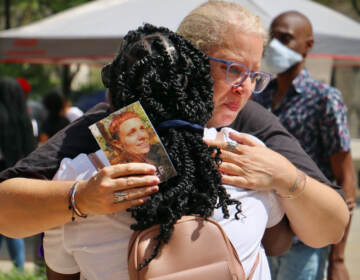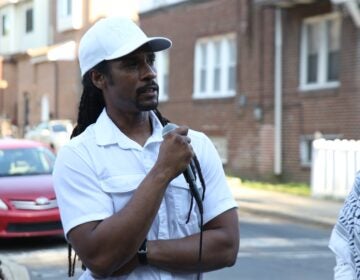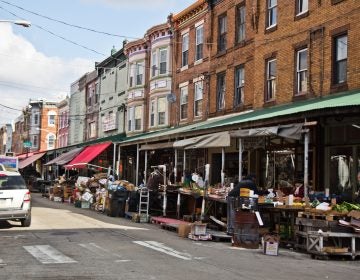Chestnut Hill residents concerned about impact of AVI
-
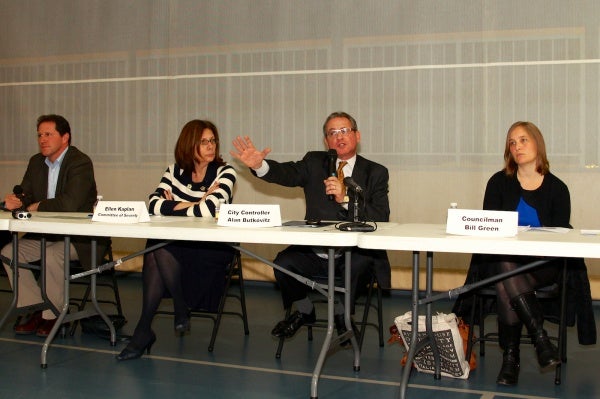
Butkovitz says city residents must keep pressure on City Council to keep millage rates as close to 1 percent as possible. ( Jana Shea /for NewsWorks )
-
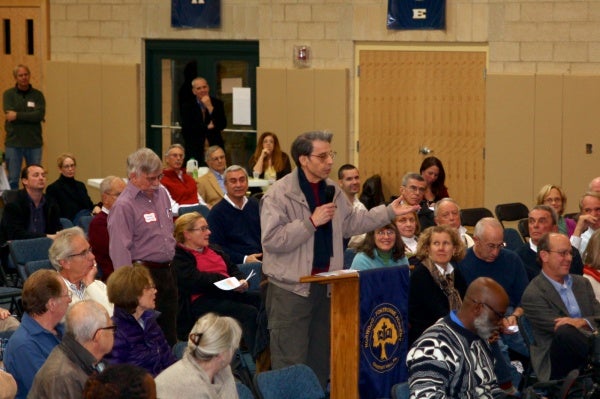
<p>Chestnut Hill residents voice concern about AVI millage rates and how they may be effected by the city's homestead exemption. ( Jana Shea /for NewsWorks )</p>
-

<p>Local real estate developer, Sanjiv Jain voices concern that AVI will drive him away from Chestnut Hill. ( Jana Shea /for NewsWorks )</p>
-
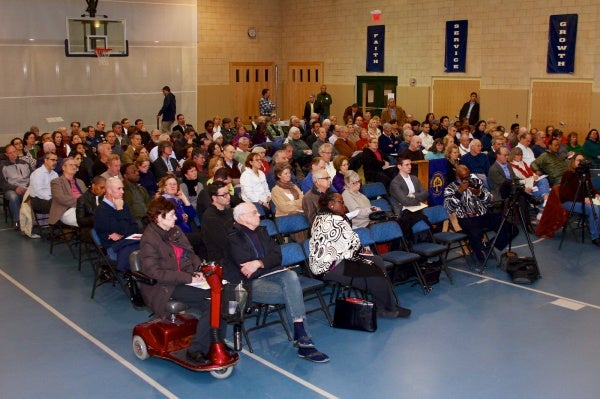
<p>Around 130 residents attended CHCA's AVI panel discussion Wednesday night. ( Jana Shea /for NewsWorks )</p>
-

Former Philadelphia City Controller Alan Butkovitz plans to challenge Mayor Jim Kenney. (Jana Shea for WHYY, file)
-
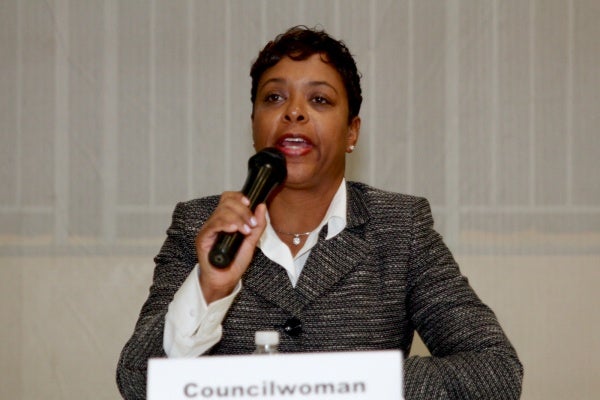
Eighth District City Councilwoman, Cindy Bass is in favor of the Homestead Exemption. ( Jana Shea /for NewsWorks )
-
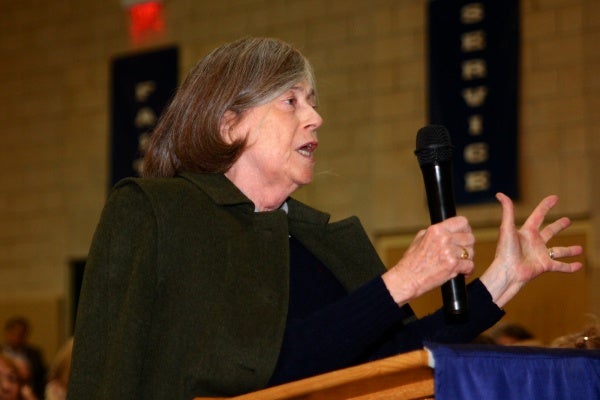
<p>Elizabeth Olson notes property values are determined by a multitude of factors and market rates can fluctuate dramatically. Residents want full transparency on the standards by which their homes will be assessed. ( Jana Shea /for NewsWorks )</p>
Which neighborhood will see the highest real estate tax increase when the city’s Actual Value Initiative (AVI) is eventually implemented? Property owners in the city’s Chestnut Hill neighborhood fear it will be them.
During a Wednesday night panel discussion on the topic, more than 130 residents showed up to voice that concern and hear elected and city officials weigh in on the controversial subject.
The evening event, organized by the Chestnut Hill Community Association, included City Councilmembers Cindy Bass and David Oh, Ellen Kaplan with the Committee of Seventy and City Controller Alan Butkovitz. Brett Mandel, a Democratic candidate for Controller, and Rachel Meadows, policy and research analyst for at-large City Councilman Bill Green also participated.
Bracing for impact
During the evening event inside Norwood-Fontbonne Academy, some residents expressed deep resentment towards potential real estate tax increases.
Apostolos “Tolis” Vardakis noted that the city already has trouble collecting property taxes. Once AVI is in place, he said he thinks the amount of uncollected tax revenue will only rise.
He’s concerned Chestnut Hill, one of the city’s most affluent neighborhoods, will end up shouldering more of the resulting burden than it should.
“This is where the money is and this is where you’re going to come to get the taxes,” he said.
Rather than continually raise taxes, city officials should look to do more to cut government spending, he proposed.
Fellow Chestnut Hill resident Sanjiv Jain said AVI will have “a profound impact” as it would not only affect his own home, but also the local real estate he owns.
Jain said he’ll have to choose between absorbing the potential increases or passing them on to his tenants, who are already struggling to survive in a tough economy. He’d like to see the potential tax increase limited to five percent.
A necessary fix
Panelists weren’t unsympathetic.
“It’s absolutely clear that we have a system that is broken, that is damaged and does not work,” said Bass, noting that fixing will require a balanced approach so as not to place too much burden on any particular area of the city.
“This part of the district has been paying their fair share, if not more, for quite some time,” Bass told attendees.
Responding to Jain’s concerns, Butkovitz said, “The whole issue is impact. This is real people’s lives.”
Still, with the exemption of Butkovitz, who steadfastly opposes AVI, the panel members agreed the question is not whether or not to fix the property tax system, but how to do so.
“There’s still a lot of undecided in this entire discussion,” Meadows commented.
Mandel, who once served on the city’s Tax Reform Commission, said it’s important to make certain AVI is revenue neutral and that reassessments are accurate and being done by credentialed assessors.
He noted that there should also be an appeals process in place and an advocate for tax payers. Property owners should know by which standards assessment values are obtained and why. Kaplan, who serves as vice president and policy for Seventy,agreed.
“It has to be an open and transparent process,” she said.
OPA missing from the conversation
Notably absent from the panel was any representation from Philadelphia’s Office of Property Assessment (OPA), which is tasked with gathering and compiling data on property values throughout the city.
CHCA Board President Brien Tilley told attendees that OPA had been invited, but Mayor Nutter’s Office did not approve the debate-like setting.
As a result, panel members could only speculate and give their best opinion as to the probable outcomes of AVI.
“They have most of the answers,” noted Bass.
Tilley says CHCA will soon schedule an additional informational AVI session where OPA can deliver a presentation to the community.
Next steps
In February, the aggregate value of the city’s properties is expected to be released, according to Meadows.
That figure is estimated to run between $80 and $100 billion once all of the reassessments are complete.
Property owners at that time will receive the reassessment stats for their property in the mail. Council will be privy to that information as well and begin the process of determining the millage rate or property tax rate.
Exemptions such as the proposed gentrification and homestead exemptions would mitigate thousands of dollars in property assessments for those who qualify.
However, the exemptions would also lower aggregate value and increase millage rates. The amount by which they would depends on how many people apply and the amount of, the as yet undecided, benefit of the exemptions.
Among the panel, only Bass voiced support for the homestead exemption. She noted that for folks living in lower end of the Eight District, who may have homes with property values around $60,000, “a $30,000 exemption is a big deal. It will make a difference.”
The savings could help a family stay in their home, she said.
Deadlines
Council must pass AVI by June or the state will force the city to do so via court order, Meadows said.
Last year, Council banded together to halt the implementation of AVI until 2014. Bass noted that unity came about because data was lacking on the aggregate value and the latest technology was not being used to ensure accurate assessments.
We can be on one accord again,” Bass assured attendees. “We’re serious about this.”
WHYY is your source for fact-based, in-depth journalism and information. As a nonprofit organization, we rely on financial support from readers like you. Please give today.


